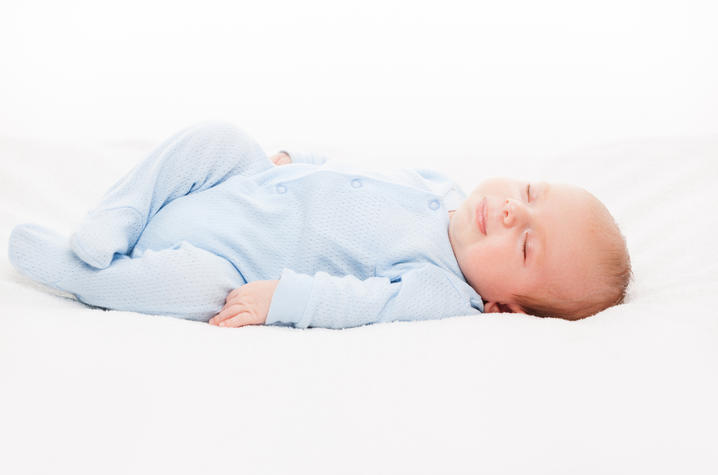UK HealthCare Receives Coveted Safe Sleep Gold Level Certification

LEXINGTON (Dec. 20, 2017) – Cribs for Kids National Infant Safe Sleep Initiative recently named UK HealthCare a Gold Level Champion in recognition for its commitment to promote safe sleep practices and reduce infant sleep-related deaths. UK HealthCare is the only hospital in Kentucky with this designation.
To achieve certification, nurses and staff in Maternal/Child Services and Neonatal Intensive Care Unit (NICU) receive extensive training in infant sleep-related deaths, as well as implement wearable blankets for infants, conduct internal audits of progress and success, and engage in community outreach about safe sleeping practices. UK HealthCare partners with the Halo Organization to provide sleep sacks for infants. Sleep sacks are available to babies in NICU, Maternal/Child, and Kentucky Children's Hospital.
Nurses and hospital staff demonstrate safe sleep practices for parents and caregivers before discharge. "Parents are more likely to do what they see us do rather than what we tell them to do," said Lisa McGee, the neonatal specialist who spearheaded the UK HealthCare's campaign for gold level certification.
Before being discharged with their infant, new parents and caregivers watch a video about safe sleep and receive written and oral instructions about safe practices. They also receive a board book to read to their babies entitled "Sleep Baby Safe and Snug".
Other safe sleep tips include:
- Always place your baby alone, on his or her back, in a crib for EVERY sleep time.
- Always use a firm, flat sleep surface. Car seats and other sitting devices, swings, wedges, and devices that position baby on an incline are not safe for routine sleep.
- Use a firm sleep surface with a firm crib mattress, covered by a fitted sheet. A crib, bassinet, or portable crib/play yard that conforms to the safety standards of the Consumer Product Safety Commission and ASTM International (formerly the American Society for Testing and Materials) is recommended. In addition, parents and providers should check to make sure that the product has not been recalled.
- Room-share, but do not bed share. The American Academy of Pediatrics (AAP) recommends that a parent and infant sleep within a "sensory" distance of each other, meaning that each can tell that the other is near, by their touch, sight, or even smell. Bed-sharing is not recommended as a form of safe sleep. It puts babies at risk of suffocation, strangulation, and sudden infant death syndrome (SIDS). Studies have found that bed-sharing is the most common cause of deaths in babies, especially those 3 months and younger.
- There should be no smoking near pregnant women or infants. Set strict rules for smoke free homes and cars. Eliminate second-hand tobacco smoke from all places in which children and other nonsmokers spend time.
- Because there is no evidence that bumper pads or similar products that attach to crib slats or sides prevent injury in young infants, and because there is the potential for suffocation, entrapment, and strangulation, these products are not recommended.
- Don’t overheat or overdress your baby. Dress your baby in light sleep clothing. Keep the room at a temperature that is comfortable for an adult (between 68-72 degrees F).
- Breastfeeding is associated with a reduced risk of sleep-related death. If possible, mothers should exclusively breastfeed or feed with expressed human milk (i.e., not offer any formula or other non–human milk– based supplements) for 6 months, in alignment with recommendations of the AAP.
- Avoid commercial devices that claim to reduce the risk of SIDS - These devices include wedges, positioners, special mattresses, and special sleep surfaces. There is no evidence that these devices reduce the risk of SIDS or suffocation or that they are safe. Do not use home cardio respiratory monitors as a strategy to reduce the risk of SIDS.
- Travel is one of the biggest causes of sleep disturbances to a baby in many ways. As you pack your bags to travel for holidays, remember to include what you will need to ensure a separate, safe sleeping environment for your baby while away from home. If you plan to stay in a hotel, ask in advance if they have cribs available that you can use in your room.
Kentucky's rate of Sudden Unexpected Infant Death is twice that of the national average. In 2016, 103 babies died unexpectedly, the majority of which had at least one sleep-related factor.
"The American Academy of Pediatrics and the Kentucky Health Department both indicate that nurses are in a unique position to model for and educate families about safe sleep risk-reduction strategies", said McGee. "The efforts of nurses at UK to do that will hopefully make an impact in the number of SUID deaths in Kentucky."
Since 1998, Cribs for Kids has been making an impact on the rates of babies dying of accidental, sleep-related death in unsafe sleeping environments by educating parents and caregivers on the importance of practicing safe sleep for infants, and by providing Graco Pack ‘n Play portable cribs to families who, otherwise, cannot afford a safe place for their babies to sleep. Cribs for Kids currently has more than 800 licensed partners throughout the United States that implement infant safe sleep program in their communities.




